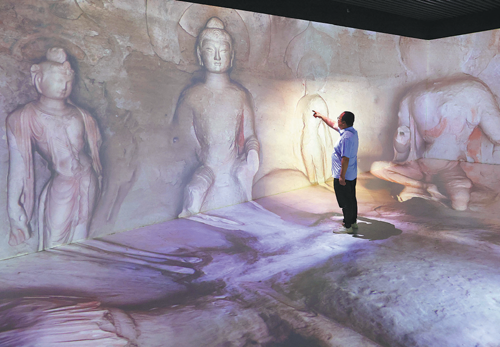

About 20 years ago, the center launched the Dispersed Chinese Art Digitization Project to reconnect Chinese artworks spread across different global locations.
The Tianlongshan Caves Project is part of this effort. With the collaboration of museums in Asia, Europe, Canada, and the US, the project has collected three-dimensional modeling data of over 100 statues taken from Tianlong Mountain.
In 2014, the University of Chicago, the Tianlong Mountain Grottoes Museum, and the Taiyuan University of Technology launched a digital restoration project combining data from the sculptures and from on-site ruins to render a more complete and accurate digital image.
The initial step in collecting data to construct a grotto image involves using point-cloud technology — a data representation of a 3D space — to capture its geometric shape. Data records are also made of sculpture texture, alongside the colors and patterns inside the grotto.
The digital restorers then merge all the data to create a detailed digital model of a sculpture, representing it as it would have been seen in its original setting.
Zhao, from Taiyuan University of Technology, said, "Despite our prior experience, the digital revival of Tianlong Mountain's Buddhist sculptures presented a substantial challenge for our team."
The mountainous terrain complicated the supply of power for the scanning equipment, while the grotto's dim lighting made it difficult to capture accurate textures and colors.
The massive size of the grottoes also made collecting 3D data a major challenge.